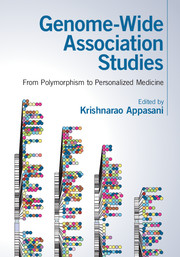Book contents
- Frontmatter
- Dedication
- Contents
- List of contributors
- Forewords
- Preface
- List of abbreviations
- Part I Genome-wide association studies
- 1 Introduction to genome-wide association studies and personalized medicine
- 2 GWAS: a milestone in the road from genotypes to phenotypes
- 3 Introduction to statistical methods in genome-wide association studies
- 4 GWAS replicability across time and space
- Part II Genome-wide studies in disease biology
- Part III Single nucleotide polymorphisms, copy number variants, haplotypes and eQTLs
- Part IV Next-generation sequencing technology and pharmaco-genomics
- Part V Population genetics and personalized medicine
- Index
- Plate section
- References
4 - GWAS replicability across time and space
from Part I - Genome-wide association studies
Published online by Cambridge University Press: 18 December 2015
- Frontmatter
- Dedication
- Contents
- List of contributors
- Forewords
- Preface
- List of abbreviations
- Part I Genome-wide association studies
- 1 Introduction to genome-wide association studies and personalized medicine
- 2 GWAS: a milestone in the road from genotypes to phenotypes
- 3 Introduction to statistical methods in genome-wide association studies
- 4 GWAS replicability across time and space
- Part II Genome-wide studies in disease biology
- Part III Single nucleotide polymorphisms, copy number variants, haplotypes and eQTLs
- Part IV Next-generation sequencing technology and pharmaco-genomics
- Part V Population genetics and personalized medicine
- Index
- Plate section
- References
Summary
Introduction
The key step to validating associations between genetic variants and complex human diseases is the replication of findings in independent samples. This was, perhaps, the main lesson learned by the community from the candidate–gene association studies that were performed prior to the era dominated by genome-wide association studies (GWAS). Since the mid-1990s, thousands of papers had been published describing new associations between candidate variants and complex diseases (Ioannidis et al., 2001). However, the actual worth of many of these publications was inherently constrained by small sample sizes, among many other factors, which imposed hard limits to statistical power; by a poor characterization of the structure of genomic variability in human populations, which generated many false positives; and by a focus on common alleles discovered in peoples of European ancestry, with frequencies usually above 5%, which resulted in a strong ascertainment bias. Due to these powerful reasons, and despite their enormous popularity, associations reported during the pre-GWAS era frequently failed to replicate in independent studies (Ioannidis et al., 2001). For instance, out of the 166 most widely studied associations by 2002, only six had been positively replicated three or more times (Lohmueller et al., 2003). This plethora of promising but eventually failed associations seriously undermined the credibility of the whole association-mapping approach, but, on the bright side, made researchers aware that they needed to do better.
Many of the problems were indeed addressed by the design of GWAS. In sharp contrast with previous association studies, the GWAS era has been characterized by much larger sample sizes, an extensive coverage of human genomic diversity, careful control of the effects of population stratification, more stringent significance thresholds to avoid false positives due to multiple testing, and, in many publications, built-in replication samples (McCarthy et al., 2008). What has been the impact of these improvements? Do associations discovered by GWAS replicate, and, whatever the answer to these questions, can we learn anything from replication attempts? In what follows, we analyze the degree and patterns of replicability of disease-associated variants discovered by GWAS during the last 10 years. We first summarize the main patterns of GWAS replicability considering the time at which discoveries were made. We study these patterns paying special attention to differences observed according to disease classes, the strength of the reported association, as well as the statistical significance in the discovery GWAS.
- Type
- Chapter
- Information
- Genome-Wide Association StudiesFrom Polymorphism to Personalized Medicine, pp. 53 - 66Publisher: Cambridge University PressPrint publication year: 2016



